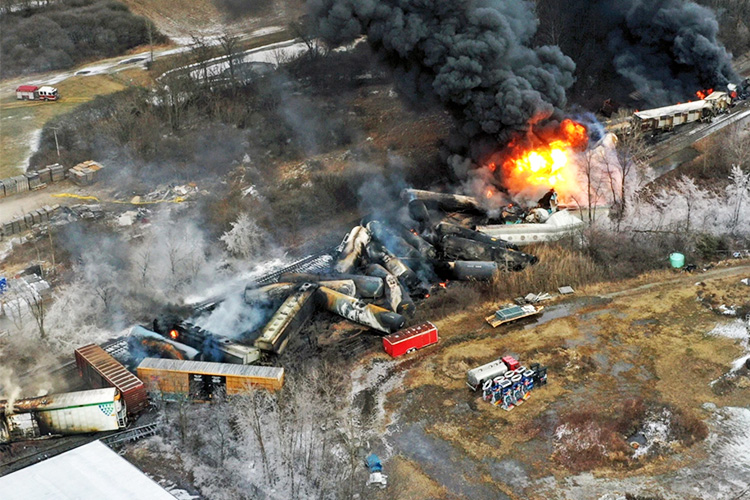
The EPA begins the controlled burn after the initial spillage of chemicals. photo by Gene J. Puskar
Due to a train derailment in East Palestine, Ohio, the beginning of the 2023 year has been a rocky ride for residents.
In East Palestine, Ohio, a Norfolk Southern freight train carrying 38 cars derailed on February 3rd, 2023. While a normal derailment has a more straightforward cleaning process, this freight train was transporting many toxic chemicals, forcing the state and federal governments to take significant action to protect the environment. After the second day of waiting for the fires to go out, state officials requested a controlled burn of the train cars and the surrounding areas to remove the hazardous materials permanently. While this seemed like an appropriate call to make at the time, the controlled burn released more chemicals into the atmosphere, such as phosgene. Phosgene is a toxic and odorless chemically produced gas that may cause a burning sensation in the eyes and shortness of breath to those exposed to it. As a result of the harmful chemicals released into the atmosphere, residents within a one mile radius of the area had to evacuate.
As residents were allowed back into their homes on February 9th, the environmental impacts of the controlled burn and the chemical spillage became apparent. Residents immediately requested to have their homes tested for chemicals from the fire, primarily due to the significant amounts of toxic waste released into the atmosphere. While the removal of hazardous substances continues, residents are still concerned about their drinking water and contaminants in the soil. Researchers suspect the train derailment contaminated at least 15,000 pounds of dirt and about one million gallons of water. The Environmental Protection Agency (EPA) stated, “19 private wells show no evidence of contamination.” Officials tested public water and groundwater sources, and after almost three weeks since the derailment, water supplies appeared safe. While there is no evidence of contamination in public drinking sources, it is still a cause for worry for most residents as the EPA still had to ship out millions of gallons of waste.
As the investigation into the impacts of the train derailment on the environment continues, it is evident that people are concerned. Over the past ten years, the United States has become more aware of the human species’ impact on the environment. Most sources say the derailment was 100% preventable had Norfolk Southern followed regulations regarding what they were transporting. But because of the new awareness concerning climate change, people are now concerned about the planet’s well-being after this disaster. Contaminated soil can leach toxic chemicals into nearby ground and surface waters, where plants and animals ingest them. Contaminated water sources can highly reduce crops and drinking water levels, increasing the likelihood of drought.
Soil deterioration is the main concern regarding the chemical contaminants from the train derailment, as East Palestine is mainly known for its agricultural professions. Soil is a finite resource, meaning its loss and degradation is not recoverable within the lifespan of a human. With the loss of soil, residents lose the ability to produce food and use community water sources. Soil contains nutrients that leach into groundwater, making it drinkable for humans. Without healthy soil, it becomes impossible to survive as a species.
While there is no evidence of chemical toxicity in the area, people are still highly concerned about this environmental disaster’s potential long-term effects. The EPA’s administrator Michael Regan stated they have not “detected any chemicals that meet a high expectation of concern.” However, people are still highly cautious due to the lack of communication between government officials and residents. Although the EPA has not found these contaminants, it is evident that something is wrong, given the high amounts of fish that have been dying in local streams. However, the government has another plan to filtrate the streams and help eliminate all contaminants, although no more information has been released. Despite significant concern and a need for long-term observation of the area, experts are hopeful for environmental rejuvenation.